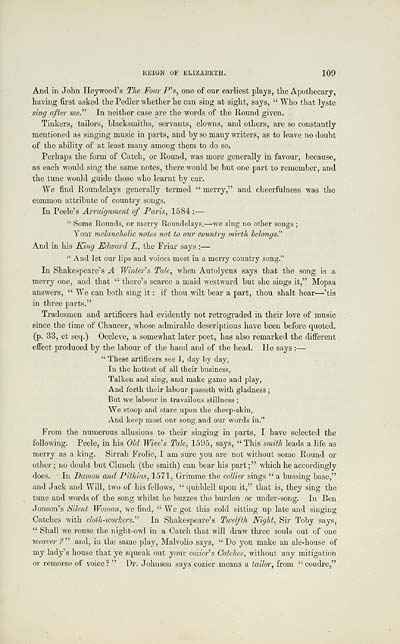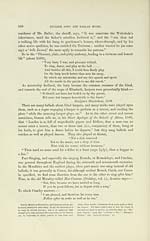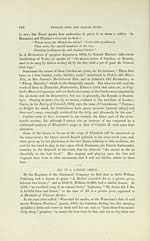Glen Collection of printed music > Printed text > Popular music of the olden time > Volume 1
(143) Page 109
Download files
Complete book:
Individual page:
Thumbnail gallery: Grid view | List view

REIGN OP ELIZABETH. 109
And in John Heywood's The Four I" s, one of our eai-liest plays, the Apothecary,
having first asked the Pedler whether he can sing at sight, says, " Who that lyste
sing after me." In neither case are the words of the Round given.
Tinkers, tailors, blacksmiths, servants, clowns, and others, are so constantly
mentioned as singing music in parts, and by so many writers, as to leave no doubt
of the ability of at least many among them to do so.
Perhaps the form of Catch, or Round, was more generally in favour, because,
as each would sing the same notes, there would be but one part to remember, and
the tune would guide those who learnt by ear.
We find Roundelays generally termed " merry," and cheerfulness was the
common attribute of country songs.
In Peele's Arraignment of Paris, 1584 : —
" Some Rounds, or merry Roundelays, — we sing no other songs ;
Your melancholic notes not to our country mirth ielongs."
And in his King Hclward I., the Friar says : —
" And let our lips and voices meet in a merry country song."
In Shakespeare's A Winter's Tale, when Autolycus says that the song is a
merry one, and that " there's scarce a maid westward but she sings it," Mopsa
answers, " We can both sing it : if thou wilt bear a part, thou shalt hear — 'tis
in three parts."
Tradesmen and artificers had evidently not retrograded in their love of music
since the time of Chaucer, whose admirable descriptions have been before quoted,
(p. 33, et seq.) Occleve, a somewhat later poet, has also remarked the different
efiect produced by the labour of the hand and of the head. He says : —
" These artificers see I, day by day,
In the hottest of all their business,
Talken and sing, and make game and play,
And forth their labour passeth with gladness ;
But we labour in travailous stillness ;
We stoop and stare upon the sheep-skin,
And keep most our song and our words in."
From the numerous allusions to their singing in parts, I have selected the
following. Peele, in his Old Wiveh Tale, 1595, says, " This smith leads a life as
merry as a king. Sirrah Frolic, I am sure you are not without some Round or
other ; no doubt but Clunch (the smith) can bear his part ;" which he accordingly
does. In Damon and Pithias, 1571, Grimme the collier sings " a bussing base,"
and Jack and Will, two of his feUows, " quiddell upon it," that is, they sing the
tune and words of the song whilst he buzzes the burden or under-song. Li Ben
Jonson's Silent Woman, we find, " We got this cold sitting up late and singing
Catches with cloth-ivorkers." In Shakespeare's Twelfth Night, Sir Toby says,
" Shall we rouse the night-owl in a Catch that will di-aw three souls out of one
weaver ? " and, in the same play, Malvolio says, " Do you make an ale-house of
my lady's house that ye squeak out your cozier'' s Catches, without any mitigation
or remorse of voice ? " Dr. Johnson says cozier means a tailor, from " coudre,"
And in John Heywood's The Four I" s, one of our eai-liest plays, the Apothecary,
having first asked the Pedler whether he can sing at sight, says, " Who that lyste
sing after me." In neither case are the words of the Round given.
Tinkers, tailors, blacksmiths, servants, clowns, and others, are so constantly
mentioned as singing music in parts, and by so many writers, as to leave no doubt
of the ability of at least many among them to do so.
Perhaps the form of Catch, or Round, was more generally in favour, because,
as each would sing the same notes, there would be but one part to remember, and
the tune would guide those who learnt by ear.
We find Roundelays generally termed " merry," and cheerfulness was the
common attribute of country songs.
In Peele's Arraignment of Paris, 1584 : —
" Some Rounds, or merry Roundelays, — we sing no other songs ;
Your melancholic notes not to our country mirth ielongs."
And in his King Hclward I., the Friar says : —
" And let our lips and voices meet in a merry country song."
In Shakespeare's A Winter's Tale, when Autolycus says that the song is a
merry one, and that " there's scarce a maid westward but she sings it," Mopsa
answers, " We can both sing it : if thou wilt bear a part, thou shalt hear — 'tis
in three parts."
Tradesmen and artificers had evidently not retrograded in their love of music
since the time of Chaucer, whose admirable descriptions have been before quoted,
(p. 33, et seq.) Occleve, a somewhat later poet, has also remarked the different
efiect produced by the labour of the hand and of the head. He says : —
" These artificers see I, day by day,
In the hottest of all their business,
Talken and sing, and make game and play,
And forth their labour passeth with gladness ;
But we labour in travailous stillness ;
We stoop and stare upon the sheep-skin,
And keep most our song and our words in."
From the numerous allusions to their singing in parts, I have selected the
following. Peele, in his Old Wiveh Tale, 1595, says, " This smith leads a life as
merry as a king. Sirrah Frolic, I am sure you are not without some Round or
other ; no doubt but Clunch (the smith) can bear his part ;" which he accordingly
does. In Damon and Pithias, 1571, Grimme the collier sings " a bussing base,"
and Jack and Will, two of his feUows, " quiddell upon it," that is, they sing the
tune and words of the song whilst he buzzes the burden or under-song. Li Ben
Jonson's Silent Woman, we find, " We got this cold sitting up late and singing
Catches with cloth-ivorkers." In Shakespeare's Twelfth Night, Sir Toby says,
" Shall we rouse the night-owl in a Catch that will di-aw three souls out of one
weaver ? " and, in the same play, Malvolio says, " Do you make an ale-house of
my lady's house that ye squeak out your cozier'' s Catches, without any mitigation
or remorse of voice ? " Dr. Johnson says cozier means a tailor, from " coudre,"
Set display mode to: Large image | Transcription
Images and transcriptions on this page, including medium image downloads, may be used under the Creative Commons Attribution 4.0 International Licence unless otherwise stated. ![]()
| Special collections of printed music > Glen Collection of printed music > Printed text > Popular music of the olden time > Volume 1 > (143) Page 109 |
|---|
| Permanent URL | https://digital.nls.uk/91369163 |
|---|
| Shelfmark | Glen.254 |
|---|---|
| Additional NLS resources: | |
| Attribution and copyright: |
|
| Description | Scottish songs and music of the 18th and early 19th centuries, including music for the Highland bagpipe. These are selected items from the collection of John Glen (1833 to 1904). Also includes a few manuscripts, some treatises, and other books on the subject. |
|---|
| Description | The Glen Collection and the Inglis Collection represent mainly 18th and 19th century Scottish music, including Scottish songs. The collections of Berlioz and Verdi collected by bibliographer Cecil Hopkinson contain contemporary and later editions of the works of the two composers Berlioz and Verdi. |
|---|

